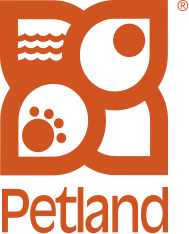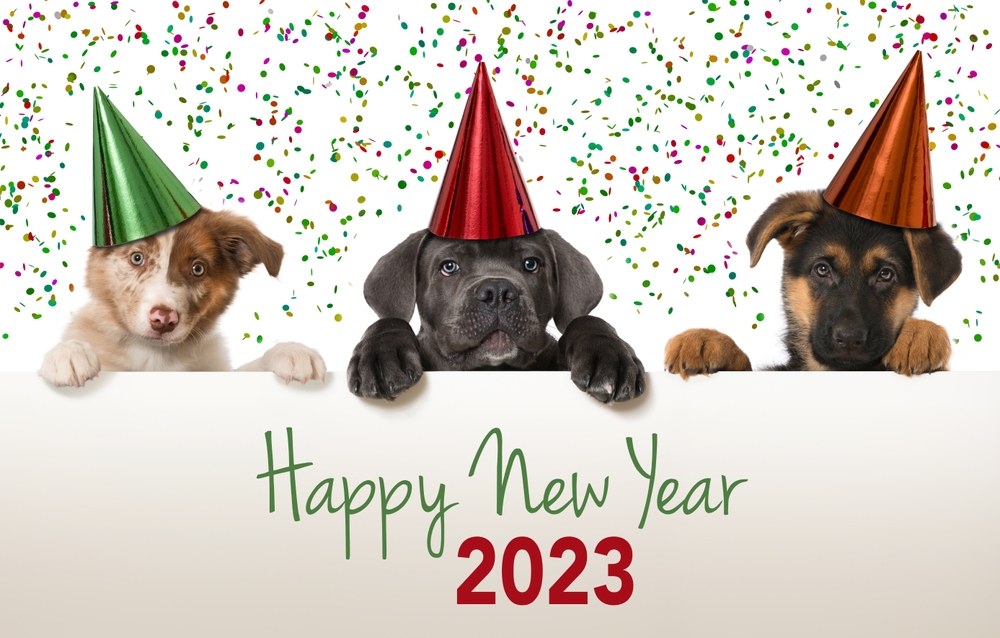Happy New Year! Wow, can you believe it’s 2023? We can’t! But we’re glad the New Year is here! If your New Year resolution had anything to do with showering a cute puppy with unconditional love for the next 10 – 15 years, then you’ve come to the right blog! Read on to find out how to kick off the New Year with a new puppy!
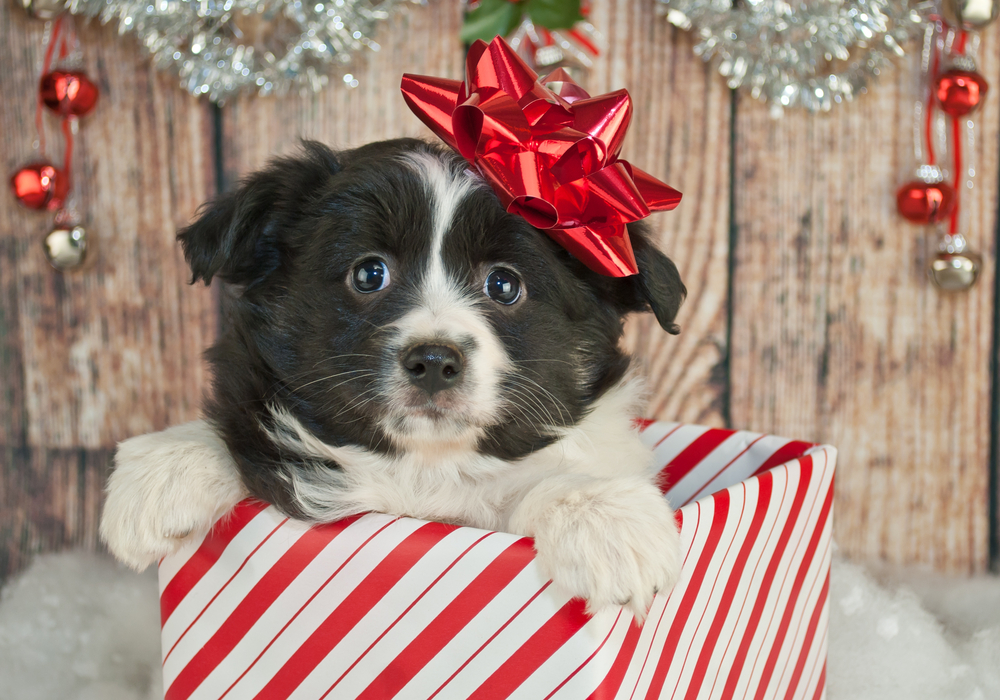
NEW YEAR, NEW PUPPY!
The first day with your new puppy will involve traveling, probably a short distance in a car from the pet store. This is the perfect opportunity to start teaching your puppy to love his crate. Be sure it’s well stocked with treats and if possible a towel or T-shirt that has the scent of his mother and litter mates. That will go a long way toward making him comfortable in his new surroundings.
When you arrive, make sure he goes to the bathroom outside before you bring him indoors. Praise him and give him a treat when he does. Keep him on a leash inside until he gets acclimated to the home. Having free run of the house shouldn’t happen immediately.
Sit on the floor with him or on the sofa if you plan to allow him on the furniture. Love him, give him your attention, and talk to him so he gets to know the sound of your voice and the touch of your hand. This is a great time to start handling him so that he learns it’s OK. Pick him up, touch his paws, look inside his ears, rub his belly, touch his tail, and groom him with a soft brush.
Housebreaking
Remember that puppies don’t have good bladder or sphincter control yet, and excitement can make them need to urgently go to the bathroom. Take your puppy out to go to the bathroom after 15 to 20 minutes of play, as well as after every meal. A potty run should be the first thing you do with him in the morning and the last thing you do with him at night.
Crate Training
Let your puppy spend a short amount of time in his crate. This is a big day for him, and he needs some time to himself in order to process his new situation. It’s okay to have the crate in the living room or some other area in the home where people are coming and going, but don’t bug him while he’s in there. Unless he needs to go to the bathroom, walk away and leave him be, but if he starts to whine or bark, he may need some extra attention.
You’ll want to schedule a vet visit for your puppy within 48 hours of bringing him home. This is important to make sure he’s in good health and to organize his future vaccination schedule. The first vet visit can be strictly for a physical exam and weigh-in. It’s a good opportunity for your puppy to meet some nice new people, get handled by them, and get some yummy treats.
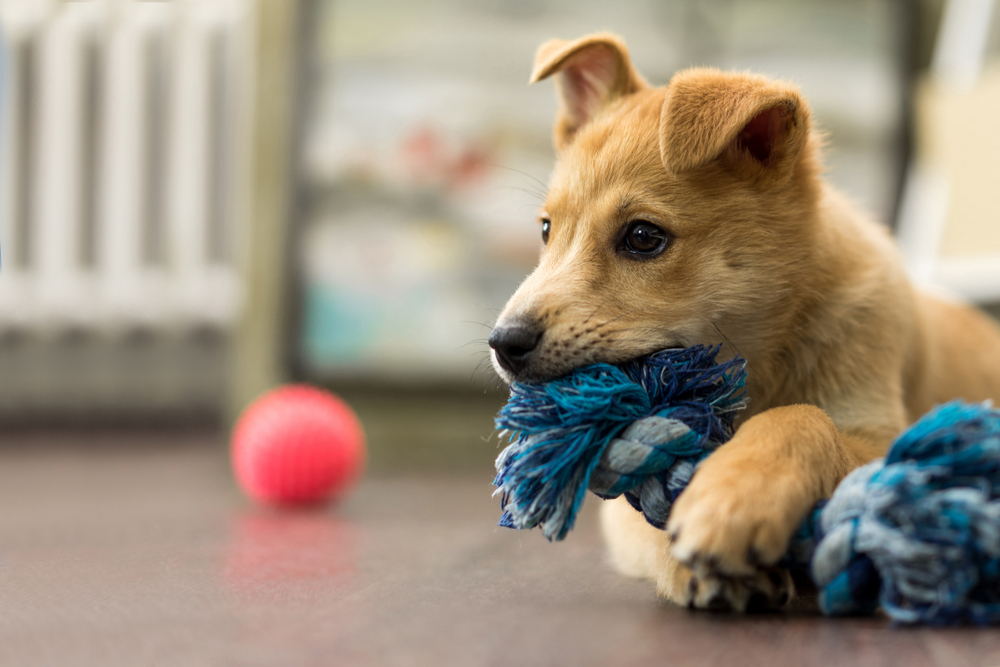
EATING, SLEEPING, AND PLAYING
Feeding your puppy does more than help him grow — it’s a way of bonding, and it gets him on a schedule that makes it easier for you to house-train him. Start with the food the pet store has recommended.
If you want to change your puppy’s food, gradually mix in the new food over a week to 10 days to help avoid upsetting his stomach and digestive tract.
We don’t recommend free-feeding puppies — leaving food down all the time — at any point in their lives. Having a regular meal time will give your puppy something to look forward to, and will help prevent obesity while ensuring that you’ll know if he starts to eat less or becomes ravenous, both of which indicates health problems.
Hand Feeding Your Puppy
Consider hand-feeding your puppy for at least the first week he is with you. Just as you would if you were feeding him from a bowl, measure his food so you don’t give too much. Give him pieces of kibble from your hand as long as he’s sitting still or looking at you. Don’t reward him for jumping up, barking, or doing anything else you don’t like. Feed him in different areas of the house.
If you walk away with the bowl and he follows you, give him some more. Sit in a chair or stand in the kitchen. Pretty soon, you can start teaching him commands, such as sit, down, or spin for kibble rewards. This shouldn’t take more than a few minutes per meal, and any family member can do it.
The longer you hand-feed, the better. This will help your puppy to develop a soft mouth, so he doesn’t nip or bite when he takes things from your hands. It teaches trust and self-control. It helps him learn not to wolf down his food. And it creates a dog who will likely be crazy easy to train, because he will be so focused on you.
Where Should Your New Puppy Sleep?
Your puppy’s socialization continues through the night — even though you’re both asleep. You may plan to let your puppy sleep on the bed, but right now he’s still too young to be allowed that privilege. When it’s bedtime, take him out for one last bathroom trip before bed and then place him in his crate with a treat and a towel that smells like you. Don’t respond to whining or barking. Tell him goodnight, and then go to bed yourself. He’ll soon settle down, and your scent and the sound of your breathing will help to calm him.
Depending on his age, he might not be able to last through the night without another bathroom trip outside. If you hear whining or scratching at the crate door late at night, hustle him outdoors, so he can go to the bathroom outside where he should, and then bring him right back into his crate. You don’t want him to get the idea that you’ll play with him in the middle of the night.
Toys for Your Puppy
You most likely bought a few toys before bringing your new pup home. Now that you’ve observed him for a couple of days, you probably have a better idea of how he likes to play and what types of toys intrigue him. If he’s a big pup who likes to chew, make sure his toys are tough. They shouldn’t have any pieces that he can chew off and swallow or any stuffing that can come out if he rips the toy apart.
Some puppies are gobblers. They will bite off and try to swallow pieces of anything else they can tear apart. If your puppy is like this, avoid giving him anything that tears apart easily, and instead stick to large, tough rubber items, such as balls that they can’t take a bite out of.
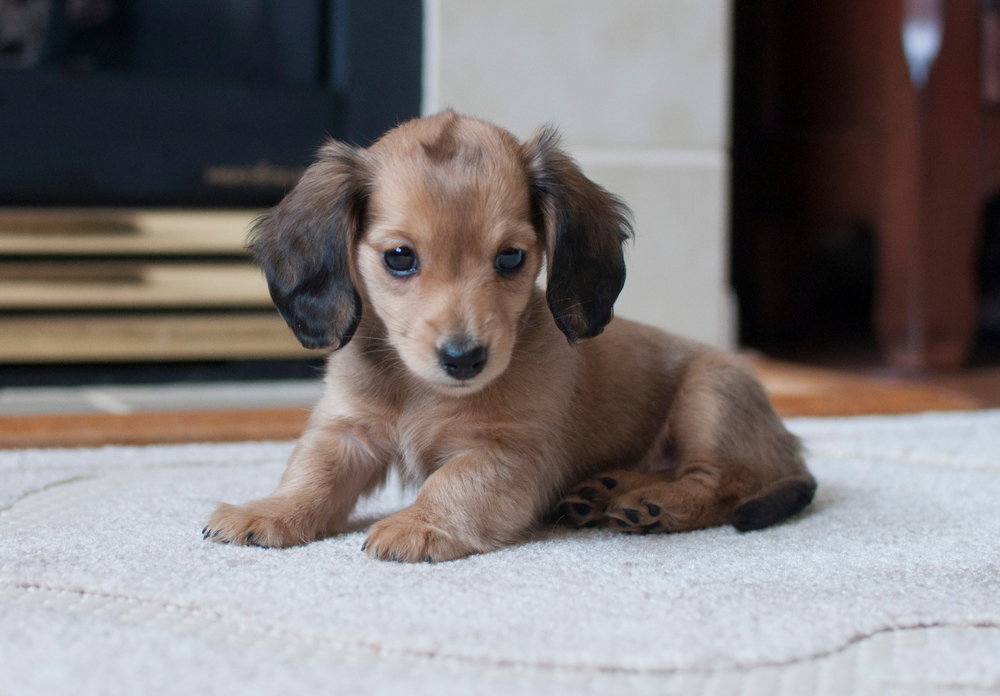
LEARNING STARTS EARLY
Depending on where you purchased your puppy, he will likely be anywhere from 7 to 12 weeks old when you bring him home. This is a critical age for him to learn the house rules and how to behave. During his period, he will soak up all kinds of information about the world around him and how he should behave in it.
This period lasts until he is 14 to 16 weeks old, so you may have as little as a couple of weeks to make the absolute most of this rapid learning stage. Of course, he’ll still learn afterward, but the things you teach during this time — good and bad — will really stick in his memory, so make sure it’s the right stuff. The goal is for him to have lots of positive experiences with friendly people, dogs, cats, and children, if possible.
Puppy Socialization
Meeting the neighbors, learning the sounds in your home and neighborhood, and going to the veterinarian for the first time are all part of your puppy’s socialization process. Once he’s been with you for a week, it will be time to introduce him to the world at large.
Also, during this learning period, your puppy should meet strangers, not just the same 10 people over and over again, so that he learns how to behave himself and contain his excitement whenever he encounters someone “new.”
We recommend introducing him to mail carriers, neighborhood gardeners, and people passing by. Take him for short car rides and take him with you when you go on errands. You can even take him into local businesses that allow dogs, just make sure he goes to the bathroom outside first. If it’s a place where other dogs might go, carry him in a puppy sling or backpack or put him in a cart so that he’s not exposed to other dogs until your veterinarian tells you he’s had enough vaccinations.
Meeting New People in New Places
Meeting new people and having lots of different experiences is important, because it will give your puppy a broad experience to draw on later in life. A puppy who has met only middle-aged people or only your friends or neighbors doesn’t cope as well when he meets other types of people, such as young children, people wearing uniforms, or people in wheelchairs.
A little adversity during this time is good for your puppy’s development, so if you notice him becoming a little nervous or stressed, comfort him but don’t discontinue the socialization session. Moderate amounts of stress during the socialization period can prepare your puppy to be ready for anything in the future.
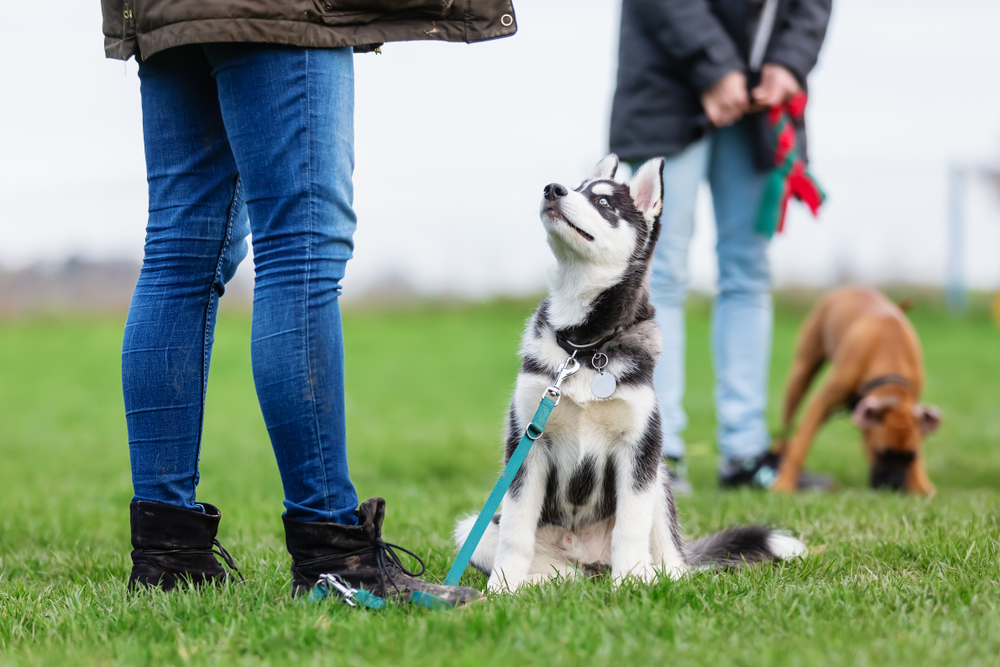
TIME FOR SCHOOL
The first two to three weeks after you bring him into your house is a great time to start training him at home. You’re teaching him how to learn and developing a relationship with him at the same time — a real win-win! It’s easy to teach tricks, such as sit, down, come, high-five, roll over, and more. You should also start to work with him on important commands like “drop it” and “give it,” which will not only improve his manners but will help to keep him safe.
You might even want to start looking for a good puppy kindergarten class as soon as you take your puppy home. By the time he has typically had two sets of vaccinations — usually by 10 to 12 weeks of age — he’ll be ready to start school. Ask your veterinarian when your puppy will be ready.
Puppy kindergarten classes offer socialization opportunities with other pups and people. The trainer can help you learn to teach your dog throughout his life. If you’re smart, you’ll never let learning end for your dog. Learning new things keeps his mind and body active and helps to keep him out of trouble.
Are you ready to kick off the New Year with a new puppy? Petland Cleveland can help! Check out our available puppies, or stop by our location to speak with one of our pet counselors today!
